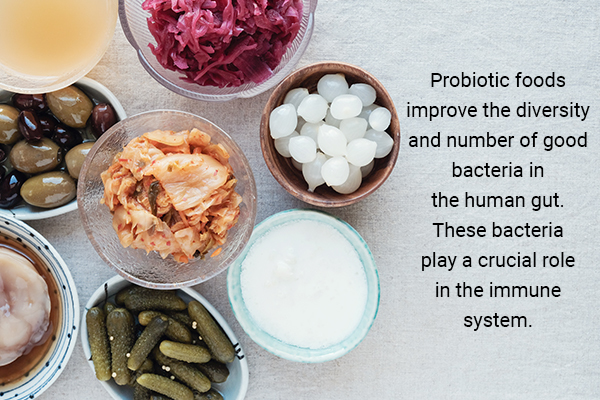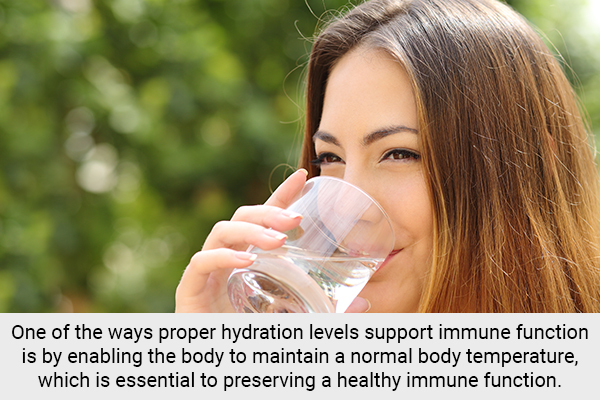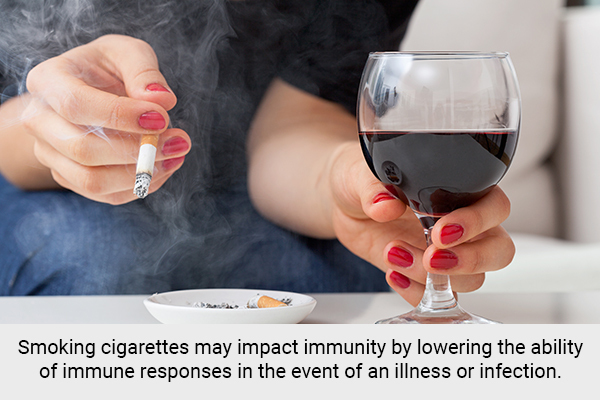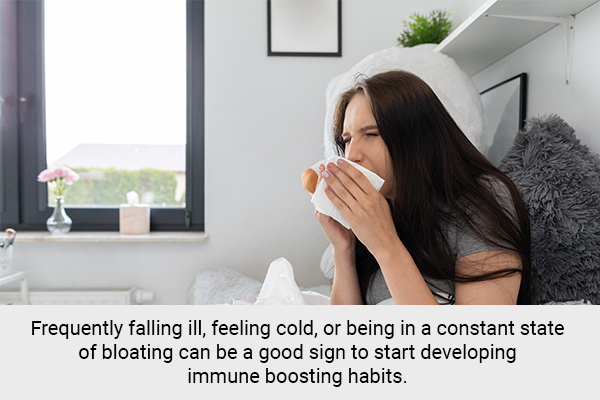In this article:
The body is well equipped to deal with a lot of illnesses on its own. Different cells of the body are involved in a defense mechanism that makes it easy to fight against infections and foreign bodies such as bacteria and viruses. (1)

While there are several infections the body can deal with on its own, medication may also be needed to be able to help the body fight against certain illnesses.
Habits That May Be Harming the Immune System
Take a look at some of the practices that can lower your body’s immunity.
1. Eating processed food
Food processing is a modern technique utilized to preserve food longer than it would last in its natural state. Different foods undergo different levels of processing and are classified accordingly. (2)
Processing food includes storing them in salt or sugar such as in the case of canned fruits or pickles, converting natural ingredients into different forms such as chips or cold-cut meats, or making juices, purees, and syrups. (2)
Evidence suggests that the consumption of processed foods can increase the risk of death. (2)
Consumption of processed foods reduces white blood cells that are responsible for fighting infection. They also increase inflammatory substances in the body, which leads to the development of chronic illnesses such as diabetes and heart diseases. (3)
Salt-rich foods such as packaged goods can also impact inflammatory substances that worsen autoimmune diseases (diseases in which the immune system attacks its own body). (3)
High amounts of fat in the diet such as those from chips and other deep-fried foods cause changes to the cells of the immune system that are responsible for detecting and fighting off bacteria. Moreover, high levels of fat trigger the immune cells even in the absence of bacteria, causing the body to attack its own fat cells. (3)
This improper signaling can also cause damage to the gut, where gut microorganisms can leak into the bloodstream and cause further damage. (3)
2. Not sleeping enough

Not many people think about the role a good night’s sleep can play in maintaining health, but sleep and immunity are closely linked.
During a period of infection, inflammatory substances in the body increase, causing more sleepiness but also interfering with the quality of sleep. (4) On the other hand, good sleep can bring about a balance of the immune response. (4)
Long-term sleep deficiency is linked to the development of chronic illnesses caused by inflammation such as diabetes, atherosclerosis (fatty plaques in blood vessels), and even neurodegeneration. (4)
Experts recommend sleeping for a minimum of 7 hours each night to stay protected from chronic illnesses and to improve immune responses. (5)
3. Not eating enough fruits and vegetables
Fruits and vegetables provide the necessary nutrients to maintain a healthy body. They contain antioxidants that are responsible for fighting inflammation and protecting the body against diseases that develop due to inflammation. (6)
Several studies have reported that a higher intake of fruits and vegetables can not only reduce inflammatory substances in the body but also improve the responses of the immune system. (6)
The World Health Organization recommends 5 servings of fruits and vegetables per day, excluding starchy vegetables such as potatoes, to maintain good health. (7)
4. Not consuming probiotic foods

Probiotic foods are those that are rich in live microorganisms such as fermented foods. Sauerkraut, kimchi, pickles, yogurt, tempeh, and cultured milk are examples of fermented foods. (8)
Probiotic foods improve the diversity and number of good bacteria in the human gut. These bacteria play a crucial role in the immune system. (9)
They improve the activity of immune cells in the intestine, lungs, and mammary glands. Probiotic-rich foods release a substance called mucin, which strengthens the intestinal walls. (9)
Probiotics also reportedly improve the intestinal and systemic immune responses during malnourished and obese states. (9)
Experts recommend consumption of 100 g of probiotic-rich foods each day to gain their benefits. (10)
5. Certain nutrient deficiencies
A healthy well-balanced diet is essential in maintaining healthy body functions including a well-functioning immune system.
Certain vitamins and minerals play a more important role than others. Vitamins A, B2, B12, C, D, E, and B9, zinc, selenium, copper, and iron are all involved in improving the immune responses of the body. (11)
Therefore, a deficiency of any of these nutrients can cause alterations to the immune system responses, making you more susceptible to infections and illnesses.
6. Drinking less water

Water is important in maintaining a robust immune system. Animal studies have found dehydration to reduce immune responses. (12)
One of the ways proper hydration levels support immune function is by enabling the body to maintain a normal body temperature, which is essential to preserving a healthy immune function. (12)
In one study, drinking adequate amounts of water improved several body functions in Japanese adults, including reducing blood pressure and maintaining normal body temperature, thereby also improving immunity. (12)
7. Less physical activity
Exercise plays a very important role in the maintenance of a healthy immune system. Several studies over the years have found that moderate to vigorous exercise for at least an hour can improve the activity of cells involved in immune responses. (13)
Daily exercise can help improve the defense mechanism of the body and metabolic health. (13)
8. Smoking and alcohol abuse

Smoking cigarettes can cause severe diseases. It impacts immunity by lowering the ability of immune responses in the event of an illness or infection. (14)
Chronic heavy drinking can decrease the number of immune cells that fight infection, increasing the risk of bacterial and viral infections. (15) Thus, it is crucial to avoid the consumption and use of alcohol and cigarettes to maintain a healthy immune system.
9. Unchecked levels of stress
Evidence suggests that high levels of stress and depression can impact human health. (16)
In an evaluation of 48 patients in an antiaging home, depression caused a decrease in the activity of natural killer immune cells that help combat viral infections and kill tumor cells. (16)
Effective ways to manage stress include good nutrition and exercise and practicing ways to improve brain health and emotions. (17)
Most-Asked Questions About the Immune System
Can taking immune-boosting supplements help?
Immune-boosting supplements may contain vitamins and minerals that are involved in improving immunity. Your doctor can help you identify the best supplement for you.
How do I know my immunity is weak?

Frequently falling ill, feeling cold, or being in a constant state of bloating can be a good sign to start developing immune-boosting habits.
Final Word
The immune system is the first line of defense against disease-causing microbes, and it also protects the body from harm due to inflammation or the food we eat.
To maintain your immunity at its best, you need to quit some harmful habits, such as consuming processed foods and including enough fruits and vegetables in the diet, among others.
Meeting your vitamin and mineral needs, ensuring daily physical activity, and getting good sleep are also crucial to maintaining a healthy immune system.
- Was this article helpful?
- YES, THANKS!NOT REALLY


